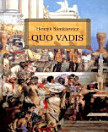Quo Vadis
Tietoa tästä e-kirjasta
Since its publication, Quo Vadis has been celebrated for its compelling narrative and historical detail. Sienkiewicz masterfully blends romance, tragedy, and spiritual reflection, using the contrast between Roman excess and Christian humility to explore enduring themes such as faith, sacrifice, and redemption. The novel's vivid characterizations — especially of Nero's tyranny and the resilience of the early Christians — have cemented its place as a classic of world literature.
The novel's lasting significance lies in its depiction of spiritual resistance in the face of moral decay. Quo Vadis remains a powerful meditation on love, transformation, and the courage to stand for one's beliefs amidst a world ruled by fear and corruption.
Tietoja kirjoittajasta
Henryk Sienkiewicz was a Polish novelist and journalist, widely recognized as one of the most prominent figures in Polish literature. Best known for his historical epics and patriotic themes, Sienkiewicz gained international fame with his novel Quo Vadis, which earned him the Nobel Prize in Literature in 1905. Writing during a period when Poland was partitioned and absent from the map of Europe, Sienkiewicz's works were instrumental in sustaining Polish national identity and pride.
Sienkiewicz is best known for his historical trilogy: With Fire and Sword (1884), The Deluge (1886), and Fire in the Steppe (1888), which depict 17th-century Poland during times of war and upheaval. These novels were both immensely popular and politically significant, reviving Polish patriotism in an era of national subjugation.
Sienkiewicz played a crucial cultural and political role for Poland. At a time when the nation was partitioned by foreign powers, his literature served as a source of inspiration and unity. His historical novels fostered a sense of identity and continuity, reminding Poles of their rich heritage and capacity for resilience.
His works, particularly Quo Vadis, also had a significant impact on international audiences and helped bring Polish literature to global attention. Several film adaptations of his novels, especially Quo Vadis, further cemented his status in the cultural canon.








